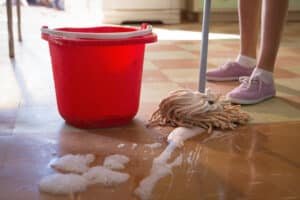Dive deeper into the world of effortless tidiness with “Habits to Keep a House Clean”. Embrace the simplicity of daily 5-minute rituals that transform your space and mindset.
Transform Your Home with These 5-Minute Daily Cleaning Habits
Hey there, folks! Let’s talk about something we all wish we could magically do – keeping our homes spick and span with minimal effort. No, I don’t have a wand, but I do have some super easy 5-minute daily habits that can make a big difference. Ready to make your home shine with just a few minutes each day? Let’s dive in!

1. Start Your Day by Making the Bed
- Ever heard of the saying, “Win the morning, win the day”? That’s exactly what making your bed can do for you. It’s not just about tidiness; it’s a small, achievable task that gives you a sense of accomplishment first thing in the morning. This mini victory can snowball into a more productive, organized day. Plus, who doesn’t love coming back to a neatly made bed at the end of the day? It’s like a little gift to your future self.
- Tip: Keep it simple. A duvet with a washable cover is a lifesaver. It cuts down the time and effort required to make your bed look hotel-level neat. Plus, the ease of washing it regularly helps in maintaining a fresh and clean sleeping environment. No more tussles with multiple layers of sheets and blankets!
- This mini victory can snowball into a more productive, organized day. Think about it – when your bed is made, your bedroom looks cleaner, and this cleanliness can inspire you to keep the rest of your space tidy. It’s like dominoes; one good habit leads to another. Plus, who doesn’t love coming back to a neatly made bed at the end of the day? After a long, hectic day, there’s something incredibly soothing about pulling back the covers of a well-made bed. It’s like a little gift to your future self, a reminder that you deserve to end your day in a calm, organized space.
2. Wipe Down Surfaces After Use
- Keeping surfaces clean isn’t just about aesthetics; it’s about maintaining a healthy living space. Regularly wiping down surfaces after use significantly reduces the accumulation of bacteria and allergens, which is especially important in high-traffic areas like kitchens and bathrooms. This practice also makes your weekly cleaning session much easier – you won’t have to scrub hard to remove stains or build-up because you’ve been managing it daily. It’s all about staying on top of things in a manageable way.
- Tip: Keep wipes or a cleaning cloth handy where you use them most. For instance, store a microfiber cloth under the sink in your bathroom and kitchen. Microfiber is fantastic because it can effectively pick up dust and grime without the need for harsh chemicals. If you’re into eco-friendly solutions, consider reusable cloths that you can wash and use again. This way, you’re not only keeping your home clean but also being kind to the environment.
- For those of you who are environmentally conscious (kudos to you!), consider using reusable cloths. They work just as well, and you can wash and use them again and again. It’s like giving the planet a little hug every time you clean. Plus, you’re reducing waste, which is always a win in our book.
3. Manage the Clutter Hotspots
- The principle that “clutter attracts more clutter” is pretty spot-on. Think of it like this: when you see a clear surface, you’re less likely to drop random items there. However, if there’s already a pile of stuff, one more item doesn’t seem like a big deal. That’s how clutter spirals out of control. By regularly clearing and organizing high-traffic areas like entryways, coffee tables, or kitchen counters, you create a visually calming and organized environment. This not only makes your home look neater but also saves you time when looking for things.
- Tip: Have a designated spot for keys, remotes, and mail to avoid pile-ups. This could be as simple as a small tray or a decorative bowl by the door for your keys, a specific drawer for remotes, or a wall-mounted organizer for mail. The key here (pun intended!) is to make these spots easily accessible and habitual. Once everyone in the house knows where these items should go, you’ll notice a significant reduction in random clutter.
- Daily Decluttering: Spend 5-10 minutes each day tidying up these hotspots. It’s amazing how quickly a space can be transformed by regular, short bursts of tidying.

4. Do a Quick Floor Sweep
- Our floors are like the silent witnesses to all our daily activities. They catch everything – from crumbs during breakfast to dust drifting in from an open window. By doing a quick sweep every day, you’re not just picking up visible bits and pieces; you’re also keeping allergens like dust and pollen at bay. This is especially important for households with allergies or pets. Plus, a daily sweep means you won’t be faced with an overwhelming cleaning task at the end of the week. It’s all about maintenance, which is easier than playing catch-up!
- Tip: A lightweight cordless vacuum or a good old-fashioned broom works great. If you have a mix of surfaces like hardwood, tile, and rugs, a cordless vacuum is a fantastic, versatile tool. It’s easy to maneuver and doesn’t require plugging and unplugging as you move from room to room. For those who prefer a more traditional method, nothing beats the simplicity of a broom and dustpan. It’s quick, effective, and gives you a bit of a workout too!
5. Sort Mail and Papers Daily
- Dealing with mail and papers daily is a game-changer in managing household clutter. Think of each piece of mail or document as a decision waiting to be made. By tackling this daily, you’re keeping on top of these small decisions, preventing them from snowballing into a daunting mountain of paper. It’s not just about reducing physical clutter; it’s also about reducing mental clutter. Knowing that you’ve sorted through your mail and documents, you can relax knowing there’s no backlog waiting for your attention.
- Tip: Recycle junk mail immediately and have a spot for important mail. When you bring the mail in, stand right by the recycling bin. Anything that’s obviously junk or not relevant can go straight in. Then, take the important mail to a designated spot – maybe a tray or folder on your desk or kitchen counter. This simple habit ensures that you only keep what’s necessary and reduces the chance of losing important documents amidst the clutter.
- Regular Purging is Key: Set a regular schedule (like once a month) to go through your important papers. File away what needs to be kept and shred or recycle what’s no longer needed. This routine maintenance prevents the buildup of outdated documents.
- Create an Organizing System: For the mail and papers you need to keep, have a simple organizing system. Use folders, labels, or even color coding to categorize different types of documents. This makes it easier to find what you need and keeps your space tidy.
6. Evening Quick Tidy-Up
- An evening quick tidy-up is like hitting the reset button on your home. It’s all about creating a fresh, welcoming environment for the next day. This routine helps prevent the accumulation of daily messes and makes your mornings more pleasant. Imagine waking up to a clear kitchen counter and a living room free of last night’s clutter. It’s not just about the physical space; it’s about setting a positive tone for the next day. A tidy space in the evening can lead to a more serene, less chaotic morning
- Tip: Involve the family. Make it a fun, quick evening routine. This isn’t just about cleaning; it’s about spending a few minutes together to care for your shared space. Set a specific time, like right after dinner or just before everyone’s bedtime routine. You can even make a game out of it: who can pick up the most toys, or who can straighten up the living room the fastest. The key is to keep it light and enjoyable.
- Set a Timer: To keep the tidy-up quick and efficient, set a timer for 5 or 10 minutes. This helps keep everyone focused and ensures the task doesn’t drag on.
- Rotate Responsibilities: If you live with others, rotate who does what each evening. This variety can keep the routine from becoming monotonous and ensures everyone contributes.
- Reward the Effort: After the tidy-up, have a family reward, like a short storytime or a favorite family song. This creates a positive association with the task and something to look forward to.

7. Deal with Dishes Right Away
- Why It Works: Tackling dishes immediately after use is a cornerstone of kitchen cleanliness and overall home hygiene. Letting dishes pile up not only makes your kitchen look messy but also creates a breeding ground for bacteria. Furthermore, leftover food scraps can attract pests like ants and flies. By dealing with dishes right away, you’re maintaining a cleaner, healthier kitchen environment. Plus, it’s psychologically satisfying to see an empty sink – it’s one less task looming over you!
- Tip: Rinse and load the dishwasher right after eating, or wash a few dishes by hand. If you have a dishwasher, rinsing and loading it right after meals can significantly reduce kitchen clutter. For those without dishwashers, quickly washing dishes by hand after use prevents the task from becoming overwhelming later.
- Make It a Part of Your Meal Routine. Just as cooking and eating are parts of your meal routine, so should be cleaning up. Integrating dishwashing into your mealtime habit makes it feel less like a chore and more like a natural part of the process.
Conclusion for Habits to Keep a House Clean!
There you have it, folks! Quick, simple habits that can keep your home looking great without spending hours on end cleaning. And hey, if you ever need a deeper clean or just want to take a break, remember that Toronto Shine Cleaning has got your back with a range of services from regular house cleaning to deep cleaning. Happy cleaning, and remember, a few minutes each day can make a world of difference!



















